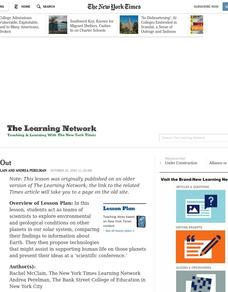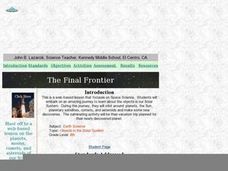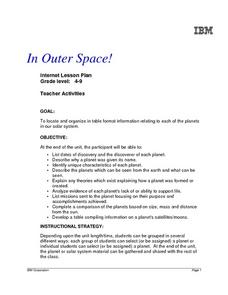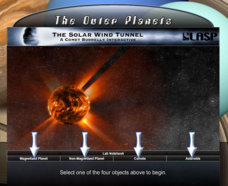K12 Reader
A Planet in the Solar System
Take young scientists on an exploration of the cosmos with this cross-curricular writing exercise. Tasked with producing an expository composition describing a planet of their choosing, students perform research and...
Curated OER
Outer Space Circus
Students investigate the concept of other planets and conduct research using a variety of resources. They focus upon a planet and its gravitation, surface, and atmospheric conditions. The lesson plan contains specific steps for the...
Curated OER
Spacing Out
Young scholars explore environmental and geological conditions on other planets in our solar system, comparing their findings to information about Earth. They propose technologies that might assist in supporting human life on those planets.
Curated OER
Planets in Our Solar System
Second graders research climate and landforms on nine planets in our solar system, choose one planet to visit, gather information about their chosen planet's climate and landforms, and "invent" space suit that would enable them to...
Curated OER
E.T., Are You Out There?
Research the necessary components of a planet that supports life after reading the article "All of a Sudden, The Neighborhood Looks a Lot Friendlier" from The New York Times. After finding their information, middle and high schoolers...
Curated OER
Outer Space Creature
Students read poems by Shel Silverstein about planets and outer space. As a class, they compare and contrast his descriptions to actual facts which have been discovered through explorations. They write a description of an outer space...
Curated OER
In Outer Space
Students use the internet to gather information on the solar system. They identify the discoverer and unique characteristics of each planet. They compare and contrast each planet based on size, mass, and distance from the sun. They...
Laboratory for Atmospheric and Space Physics
The Solar Wind Tunnel
The winds of change are blowing in our very own solar system! But what makes some heavenly bodies more affected by solar winds than others? Pupils discover the concept of magnetic forces at work in space in this...
Curated OER
Earth Science
Students explore the planets and celestial bodies in our solar system. In this outer space lesson plan, students identify the planets and record journal information about them and other celestial bodies. Students define outer space words.
Curated OER
The Drake Equation
Young scholars use the Drake Equation to calculate the probability of sustaining life on various planets. Through the use of the equation, they determine whether intelligent and advanced civilizations can be developed on planets other...
Curated OER
What's "In" There: A Study of the Inner Planets - Mercury, Venus, Earth, and Mars
First graders identify and explore the four inner planets. In this planet science lesson, 1st graders watch a PowerPoint about the planets. Students read the book Our Solar System and discuss the inner planets. Students create a book...
Curated OER
Outer Space and Beyond
Students compare and contrast the size, characteristics, composition, and orbits of the planets in our Solar System. They view a PowerPoint presentation, and in small groups conduct Internet research on a selected planet. Each group...
Curated OER
The Planet Earth
Students explore the planet Earth, outer space, and Earth's axis. They demonstrate reading comprehension skills, including literal meaning, inference and critical analysis.
NASA
Let's Investigate Mars
Take your science class on a hypothetical field trip to Mars with an engaging astronomy lesson. After first learning about NASA's Mars rover missions, young scientists plan their own scientific investigations of Earth's...
Community Consolidated Schools District 168
Solar System Model Project
Challenge young astronomers to demonstrate their knowledge of the solar system with this fun open-ended science project. Provided with a short list of requirements, students are given the freedom to use their creativity and whatever...
Curated OER
What's "Out" There?
First graders investigate the five outer planets. In this space science lesson, 1st graders read the book Our Solar System and identify the five outer planets. Students create a booklet and write about outer planets.
Curated OER
Outer Space and Cyber Space
Fourth graders learn about the Solar System while they use mean, median and mode to explore the characteristics of the planets. Students web publish expository writing.
Curated OER
Star Words
Students identify and categorize apostrophes. They create maps of the solar system and write simple sentences using apostrophes that describe each planet's characteristics.
Voyage Solar System
Round and Round We Go — Exploring Orbits in the Solar System
Math and science come together in this cross-curricular astronomy lesson plan on planetary motion. Starting off with a hands-on activity that engages the class in exploring the geometry of circles and ellipses, this lesson...
Curated OER
Out of This World Writing!
Miss Frizzle's class provides the inspiration for your young learners! Read "The Magic School Bus Explores Outer Space," and discuss the solar system. First learners will complete a KWL chart about a planet they're assigned to. Then, as...
Curated OER
Project SETI.
Tenth graders study how to search for life in outer space and make use of the 40-foot radio telescope at Greenbank, West Virginia. Request that the telescope be pointed at a particular location and time and receive data back from it...
Curated OER
My Alien
Young scholars listen to text read from "Hello! Anybody Out There?" and then brainstorm what aliens from outer space look like and do they exist at all.
They then will describe the physical features and a special ability or quality of...
Curated OER
Motion Through the Ages
Eighth graders conduct internet research to produce a timeline of man's growth in understanding of concepts of motion and planetary motion through history.
Curated OER
The Ancient World Explorer
Middle schoolers investigate the ancient structures of Mesopotamia, Egypt, India, and China. In small groups, they conduct research, evaluate their findings within the group, create visual aides, and complete an Internet treasure hunt.























